Last Updated on February 23, 2023 by Admin
Assignment: Regulation for Nursing Practice Staff Development Meeting

Nursing is a very highly regulated profession. There are over 100 boards of nursing and national nursing associations throughout the United States and its territories. Their existence helps regulate, inform, and promote the nursing profession. With such numbers, it can be difficult to distinguish between BONs and nursing associations, and overwhelming to consider various benefits and options offered by each.
Both boards of nursing and national nursing associations have significant impacts on the nurse practitioner profession and scope of practice. Understanding these differences helps lend credence to your expertise as a professional. In this Assignment, you will practice the application of such expertise by communicating a comparison of boards of nursing and professional nurse associations. You will also share an analysis of your state board of nursing.
To Prepare:
- Assume that you are leading a staff development meeting on regulation for nursing practice at your healthcare organization or agency.
- Review the NCSBN and ANA websites to prepare for your presentation.
The Assignment: (8- to 9-slide PowerPoint presentation)
Develop a 8- to 9-slide PowerPoint Presentation that addresses the following:
- Describe the differences between a board of nursing and a professional nurse association.
- Describe the board for your specific region/area.
- Who is on the board?
- How does one become a member of the board?
- Describe at least one state regulation related to general nurse scope of practice.
- How does this regulation influence the nurse’s role?
- How does this regulation influence delivery, cost, and access to healthcare?
- Describe at least one state regulation related to Advanced Practice Registered Nurses (APRNs).
- How does this regulation influence the nurse’s role?
- How does this regulation influence delivery, cost, and access to healthcare?
- Include Speaker Notes on Each Slide (except on the title page and reference page)
Expert Answer and Explanation
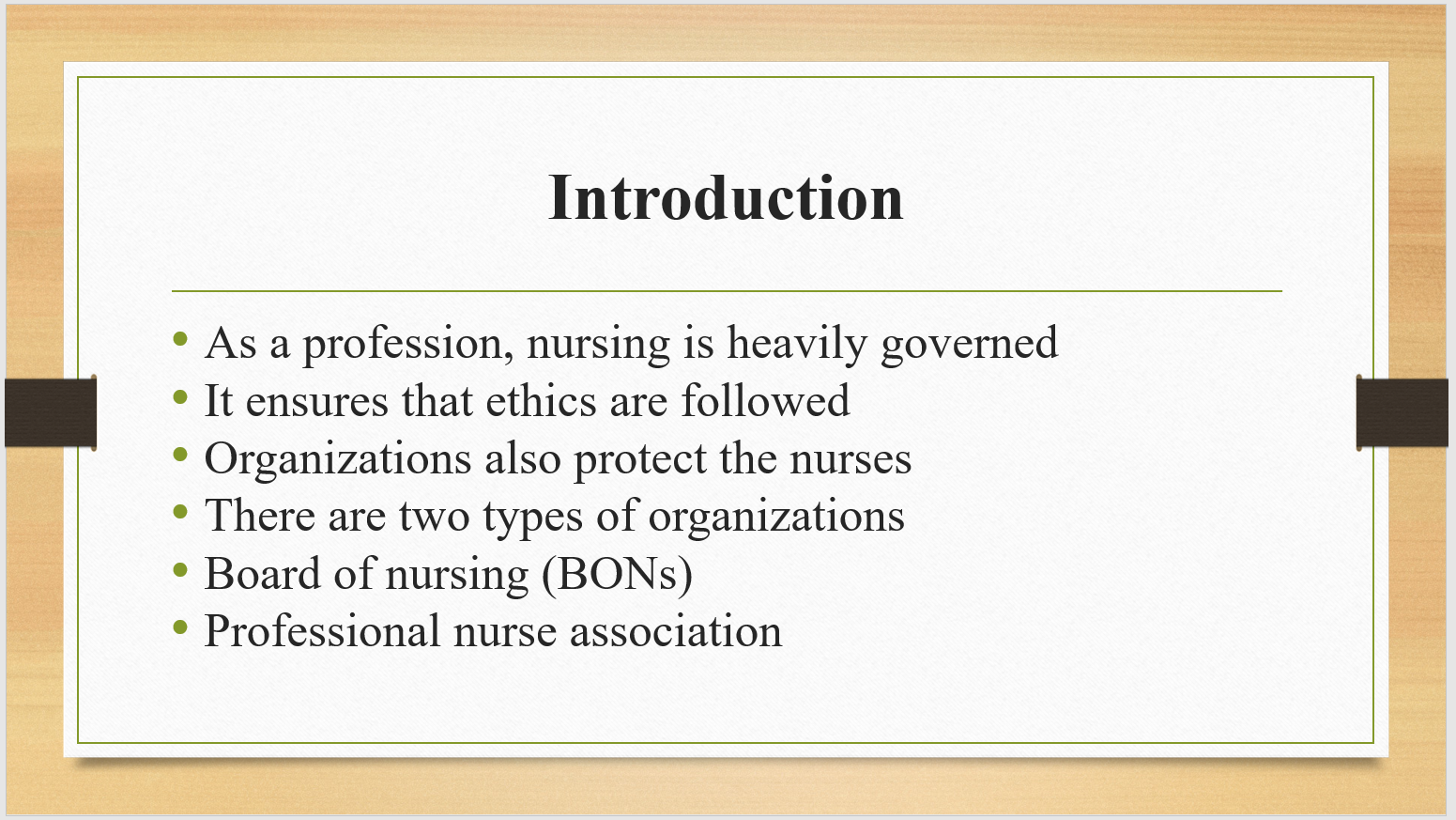
To ensure that nurses behave ethically, the profession is heavily regulated. As patient advocates, nurses have a lot of power but they can also experience oppression (Cassiani et al. 2020). Therefore while there are organizations governing their conduct others are protecting the nurses. The two types of organizations are the Board of nursing (BONs) and the Professional nurse association.
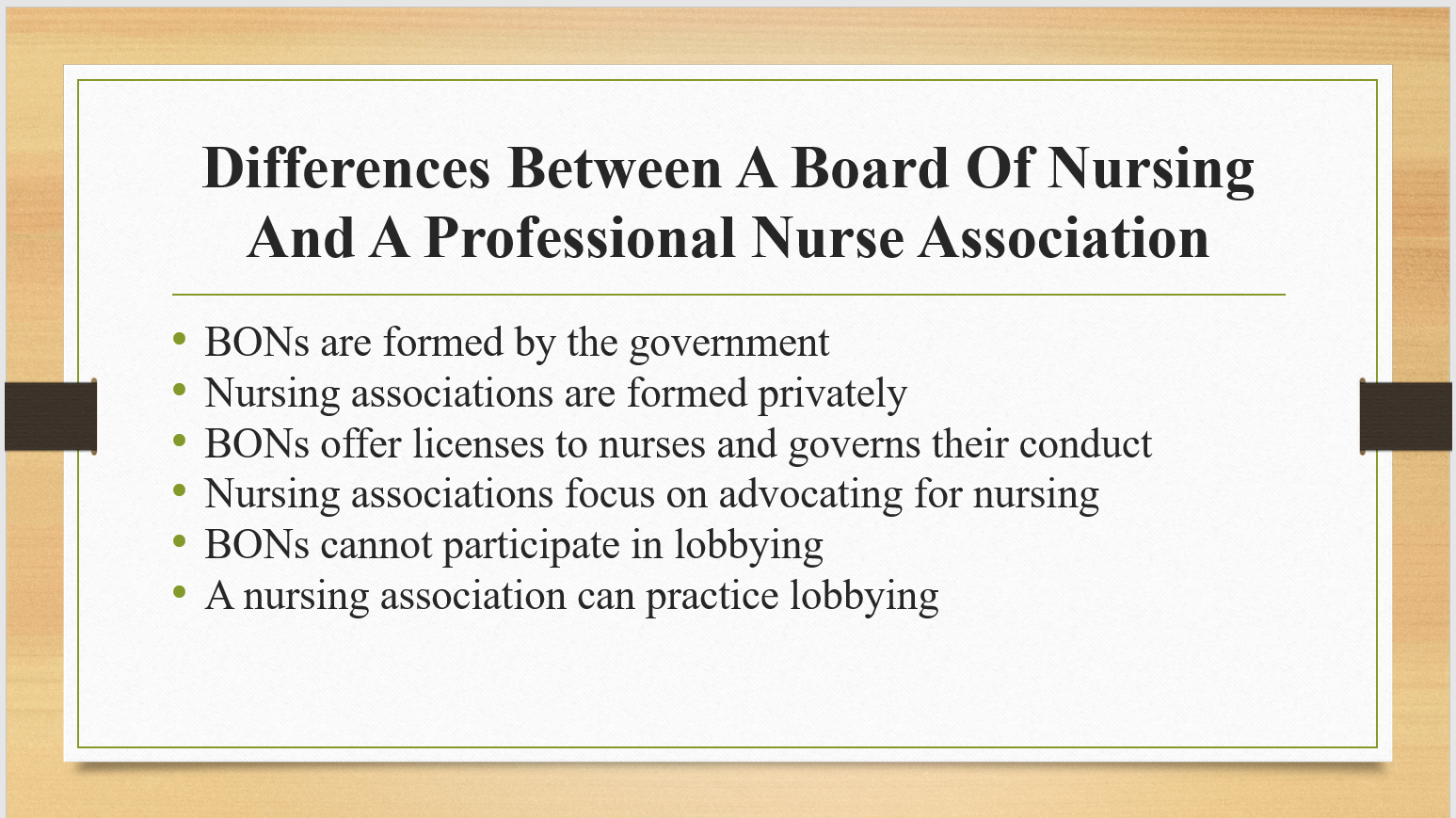
BONs are formed by the government while the nurse associations are formed privately. The main aim of BONs is to ensure that a nurse is qualified for their role while nursing associations protect the interests of the nurses (Masri et al. 2022). Notably, BONs cannot participate in lobbying while nursing associations can practice lobbying.
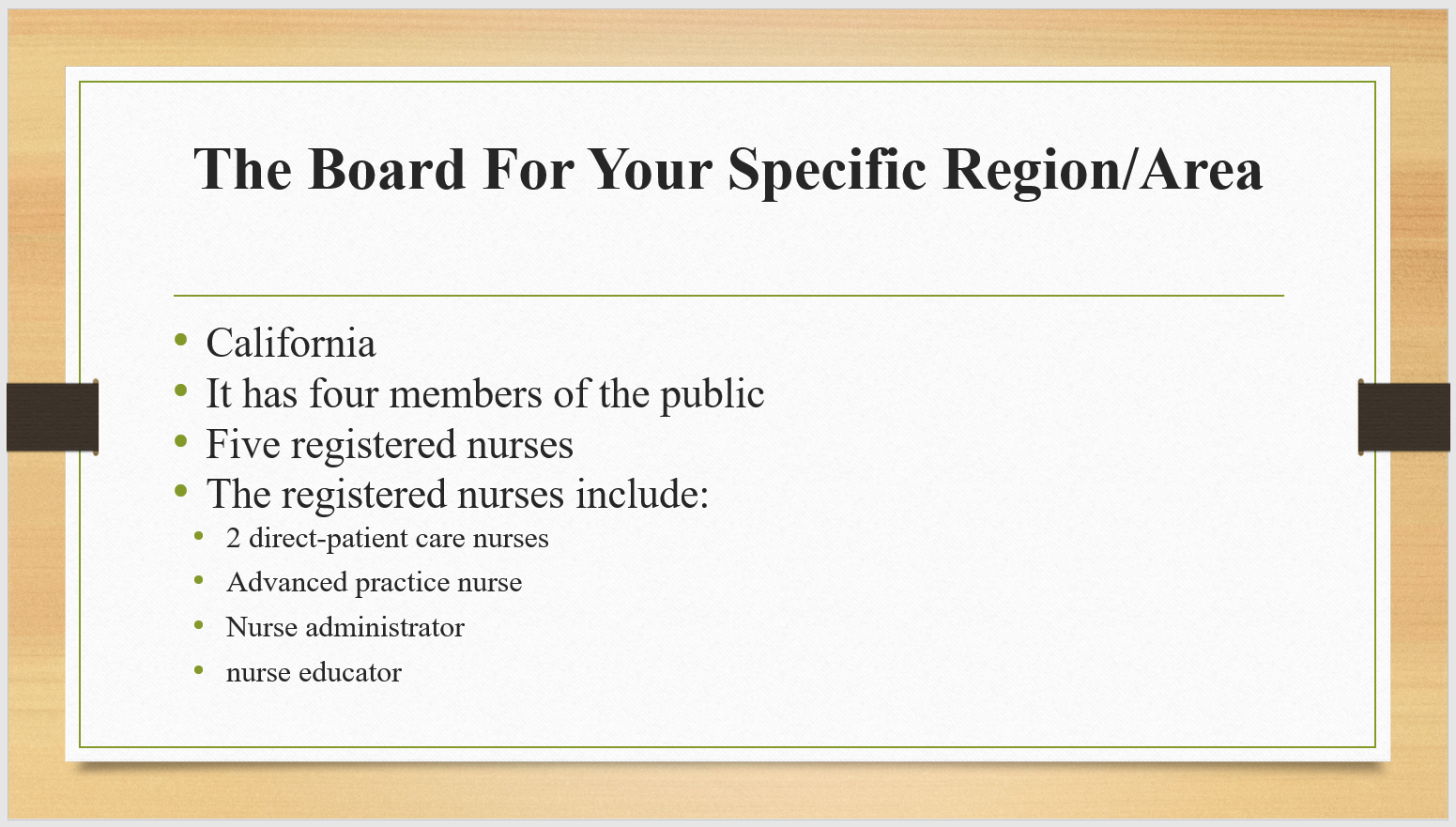
When focusing on California, it is clear that the nursing board has nine board members. Four are members of the public, while five are registered, nurses. The registered nurses include 2 direct-patient care nurses, an advanced practice nurse, a nurse administrator, and a nurse educator. Through the board, it becomes possible to ensure that nurses are well prepared before they can serve patients.

One can become a member of the board either through appointment by the legislature or the governor. seven of the members are appointed by the governor while two public members are appointed by the legislature. It is also notable that one can only serve two consecutive terms and one can also be re-appointed.
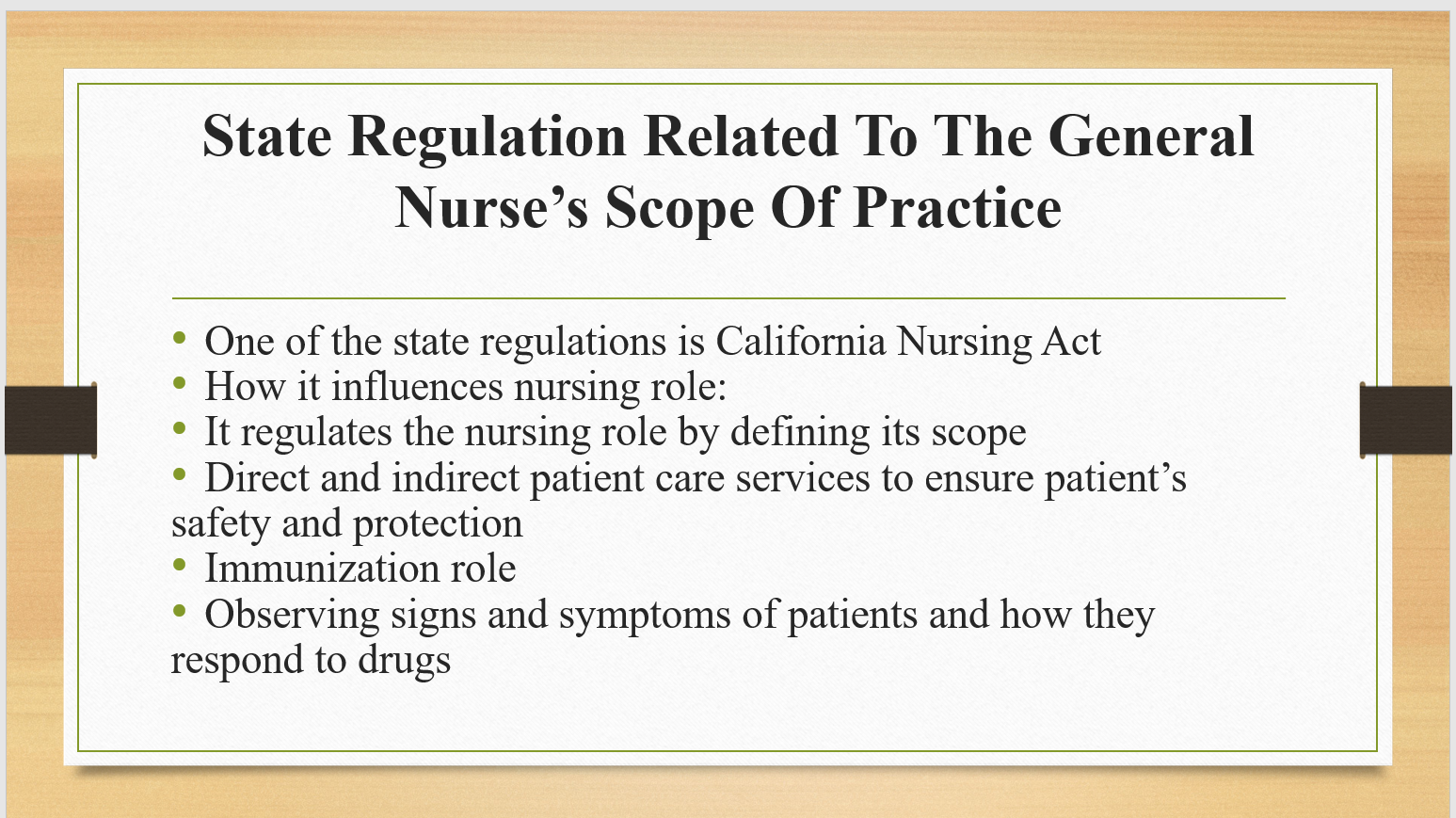
One of the state’s regulations is found under California Nursing Act. The Act defines the nursing role by clearly stating all the nursing duties and the limitations on the duties. Some of the duties include ensuring patients’ safety and protection by advocating for patients, administrating drugs, and maintaining patients’ hygiene among others (Lockhart, 2020). They are also supposed to play the immunization role and further observe the signs of the patients, and how they are responding to drugs.
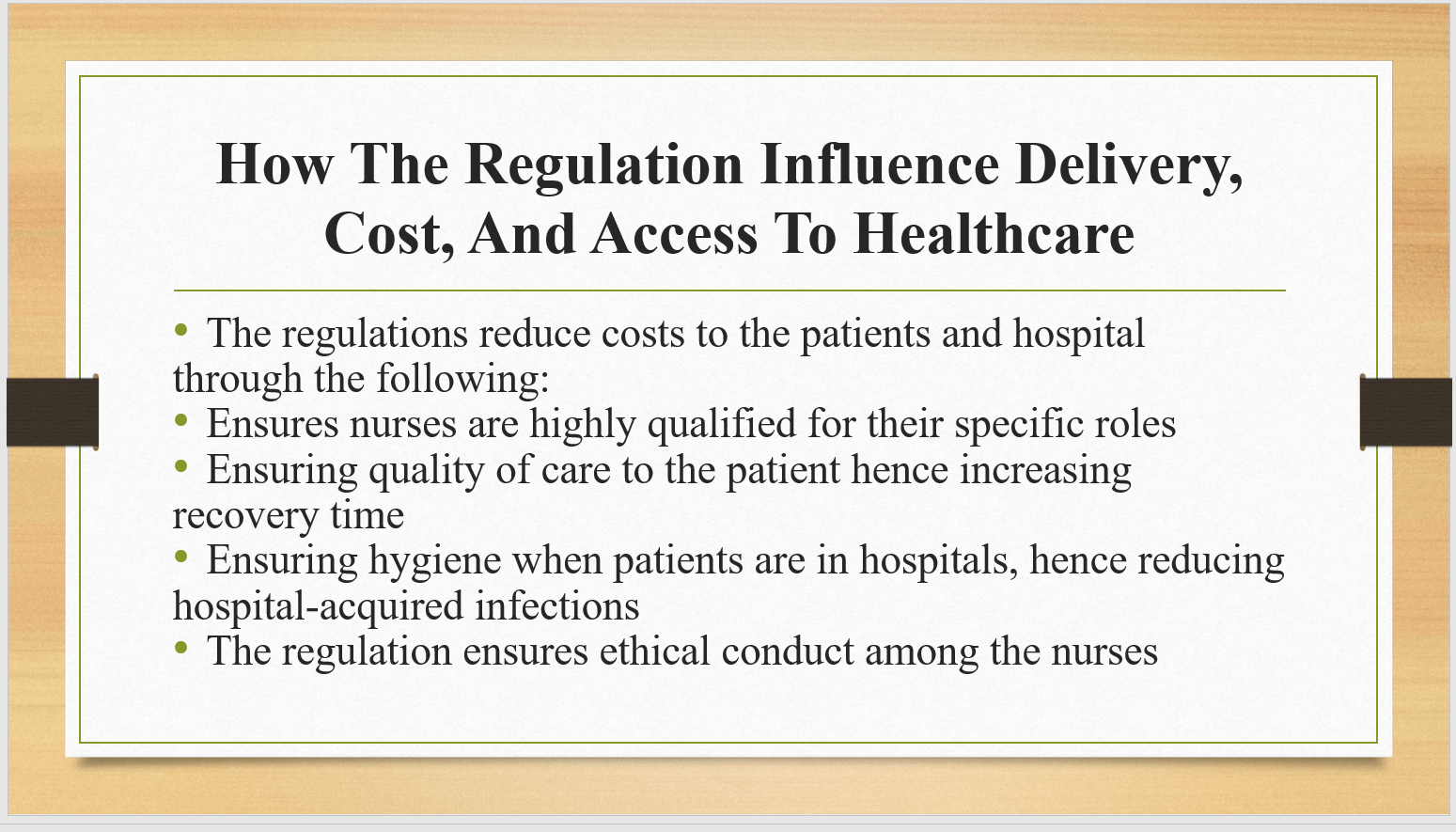
The regulation reduces the cost of treatment to patients by ensuring that nurses are highly qualified and that they pose no danger to the patients. They further ensure that nurses take care of the patients in an expected way hence reducing the recovery time. It is also their role to ensure the patients’ hygiene in hospitals, which reduces the risk of hospital-acquired infections (Ryan Davis, 2020). Most importantly it ensures that nurses behave ethically hence reducing the risk to patients’ health.
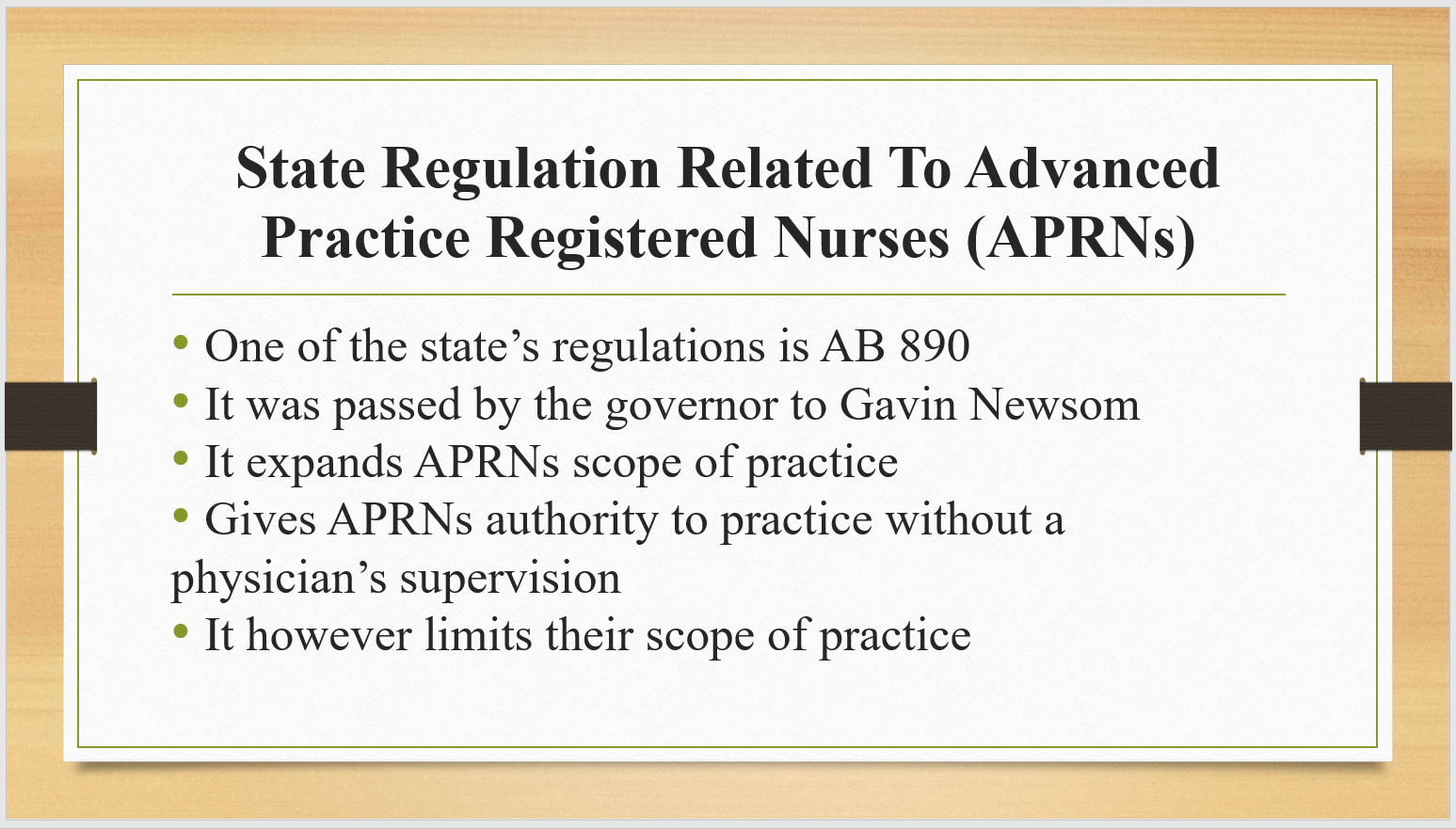
One of the healthcare regulations governing APRNs is AB 890 which allows nurses to practice independently. It was recently passed by governor Gavin Newsom to expand the scope of practice. It further offers the APRNs authority to practice without a physician’s supervision (Ortiz et al. 2021). Although it expands the scope of practice for APRNs the scope is limited to some extent and any advanced medical case must be referred to a physician.
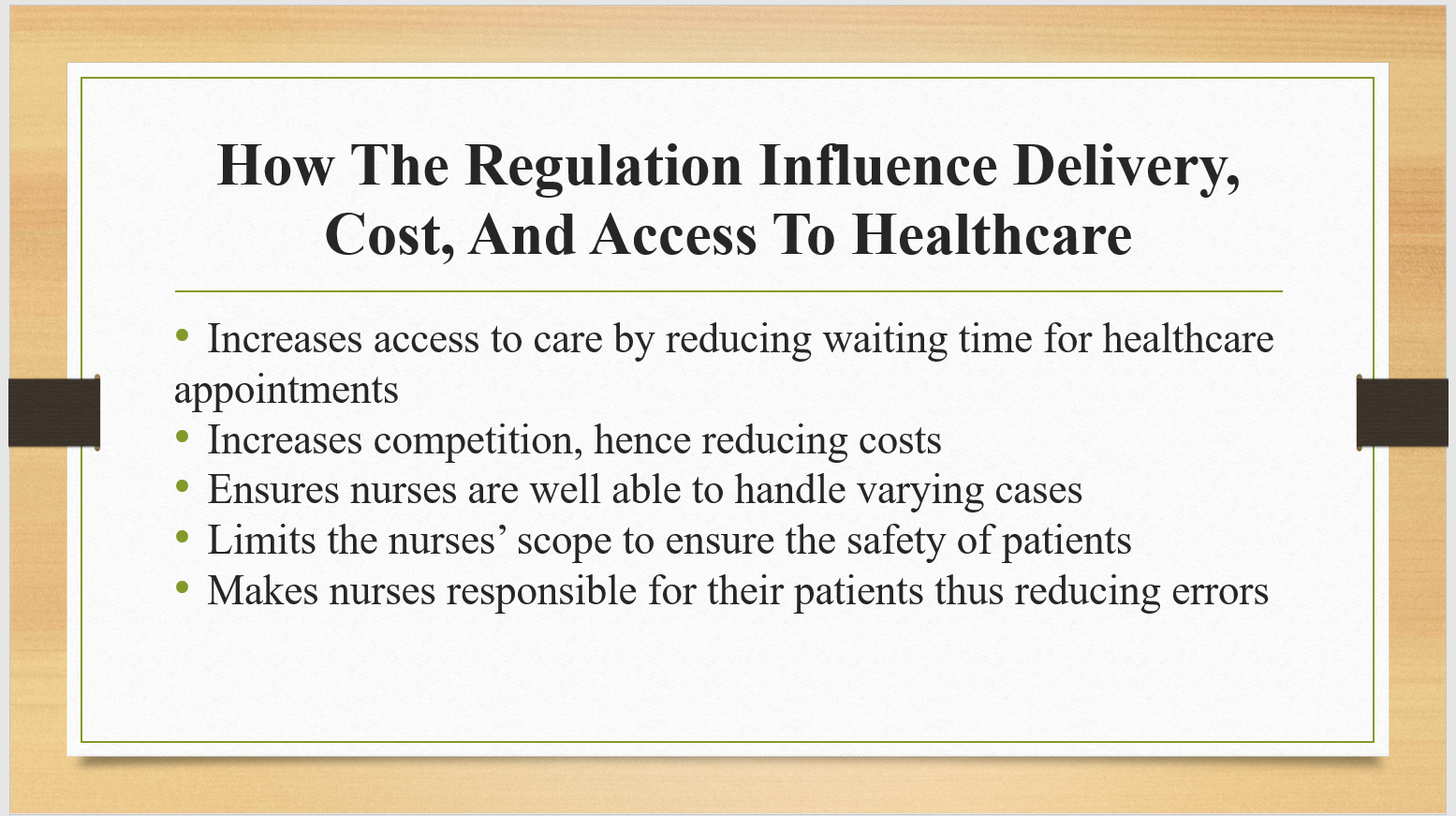
The regulation has effectively reduced the waiting time for patients as it has increased the number of practitioners available. Moreover, it has increased competition in healthcare delivery, hence reducing the cost of care for the patients. The regulation further ensures that nurses can handle the cases by requiring an experience of more than 3 years in practice. Even if the nurses can practice, their scope is limited to ensure the safety of patients, and it further makes nurses responsible for patients hence reducing errors.
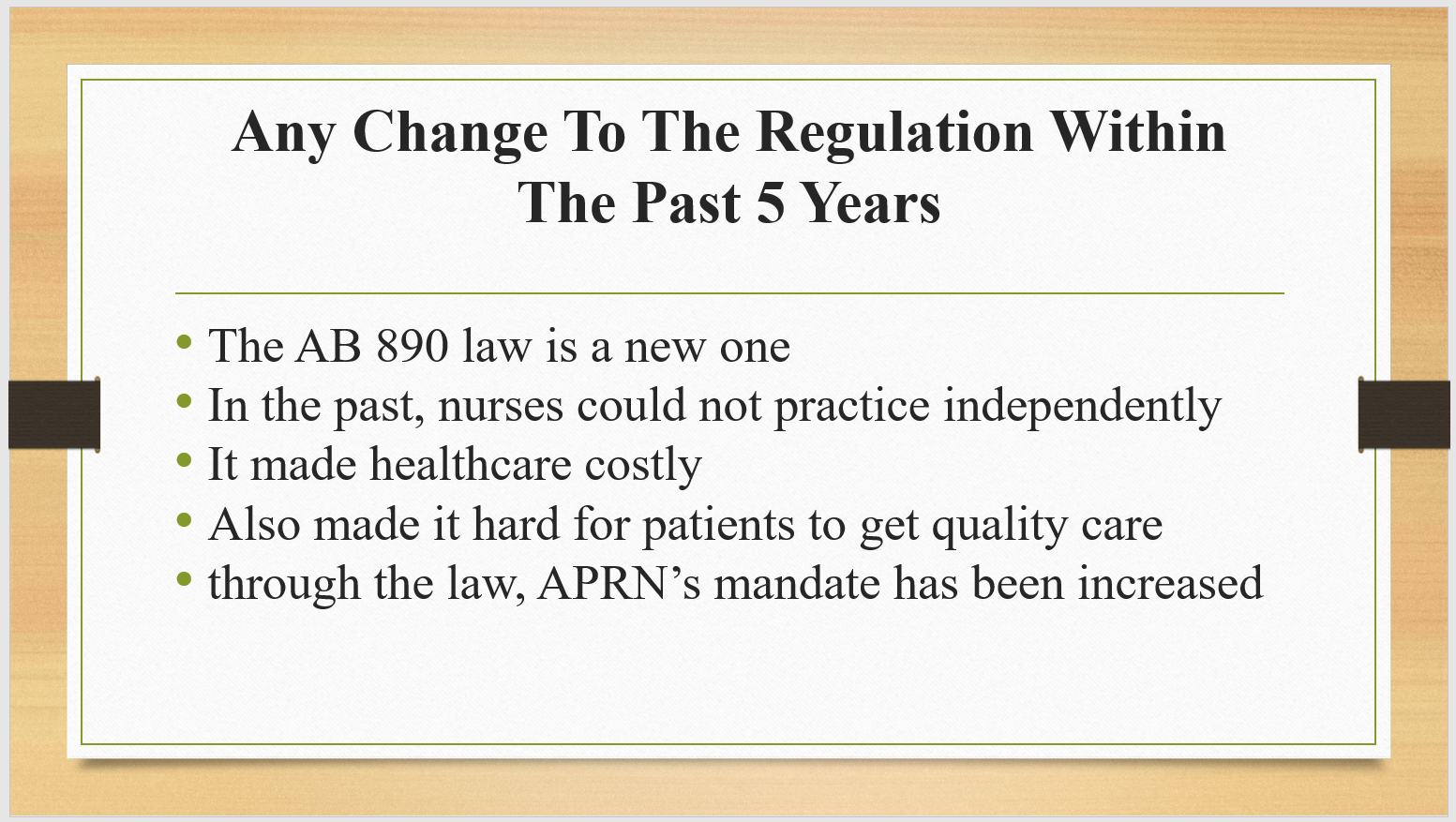
AB 890 is a new law as it was recently passed. In the past nurses could not practice independently and this increased healthcare costs tremendously. Moreover, it made it hard for patients to get quality care due to the waiting time and the limited number of physicians (Spetz & Muench, 2018). Through the law, it has been possible to increase the accessibility of healthcare in the state.
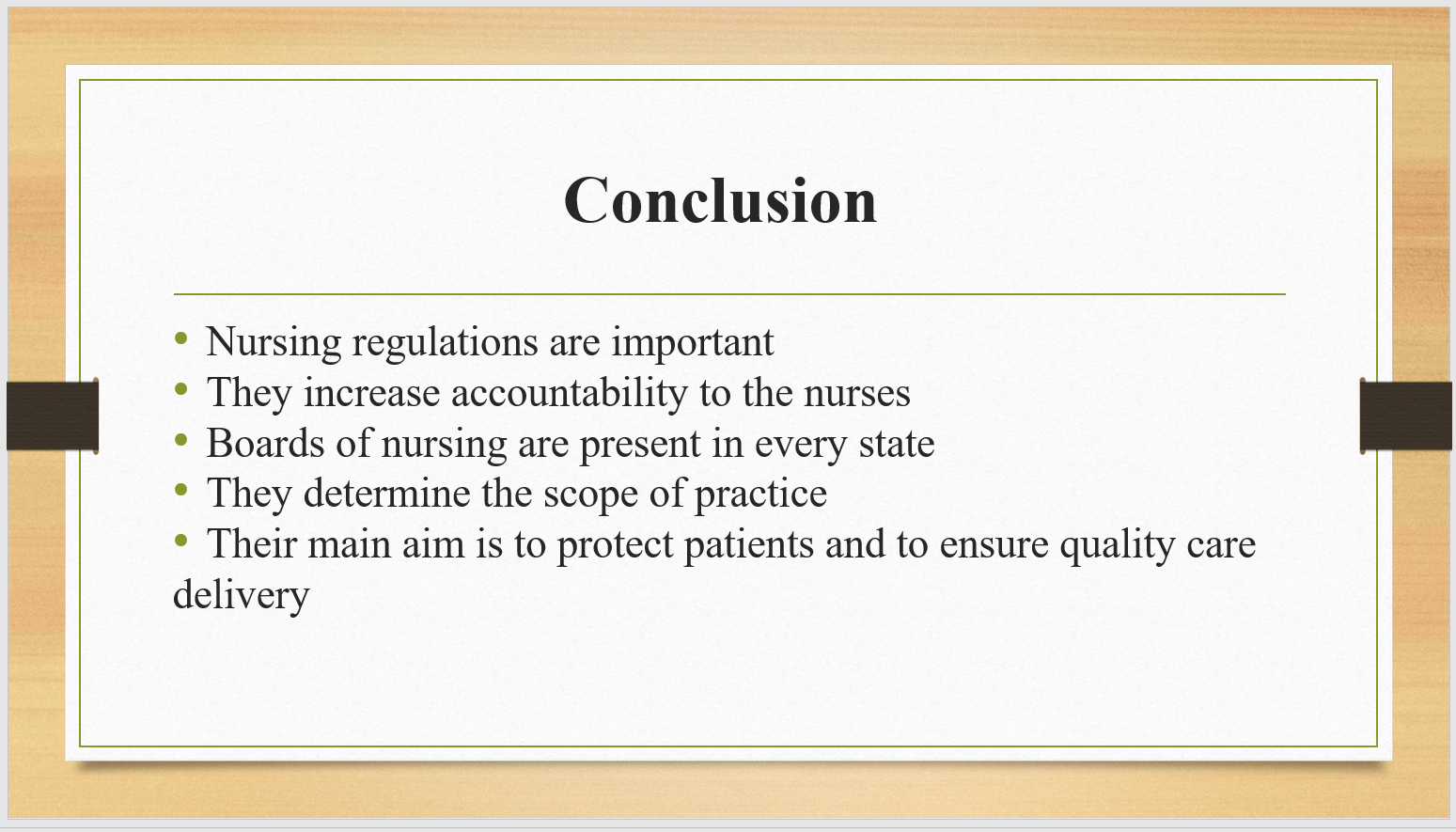
Nursing regulations are crucial as they hold nurses accountable and ensure that they behave ethically. There are boards of nursing present in every state, and they are responsible for coming up with laws that govern the scope of nursing. Through the board, the patients’ well-being is protected by ensuring that nurses are qualified and they can only practice within their qualifications
References
- Cassiani, S. H. D. B., Lecorps, K., Cañaveral, L. K. R., da Silva, F. A. M., & Fitzgerald, J. (2020). Regulation of nursing practice in the Region of the Americas. Revista Panamericana de Salud Pública, 44.
- Lockhart, L. (2020). Nurse practice acts and the provision of safe, competent care. Nursing made Incredibly Easy, 18(3), 56.
- Masri, H. M., Gramme, B. F., & Stefano, K. T. (2022). Board of Registered Nursing. California Regulatory Law Reporter, 27(1), 7.
- Ortiz, D. A., Cregan, K. M., Luh, J. Y., & Kattapuram, T. M. (2021). Navigating the paradox of scarcity—the case for radiologist-driven care. Journal of the American College of Radiology, 18(1), 151-153.
- Ryan Davis, J. D. (2020). Increasing Access to Care in California by expanding mid-level practitioner scope of practice. Journal of Health Care Finance.
- Spetz, J., & Muench, U. (2018). California nurse practitioners are positioned to fill the primary care gap, but they face barriers to practice. Health affairs, 37(9), 1466-1474.
Place your order now for the similar assignment and get fast, cheap and best quality work written by our expert level assignment writers.
Use Coupon Code: NEW30 to Get 30% OFF Your First Order
Answered Questions:
[ANSWERED] Identify a quality improvement opportunity in
[ANSWERED] Develop an interview questionnaire to be used in a family-focused functional assessment
[ANSWERED] Select a family, other than your own, and seek
ANSWERED! In this project you will select an organization or
[ANSWERED] What is the significance of the product lifecycle
ANSWERED! How can different types of attributions and
ANSWERED!! Lily is a 20-year-old student at
FAQs
Describe at least one state regulation related to general nurse scope of practice
One example of a state regulation related to the general nurse scope of practice is the Nurse Practice Act (NPA) in California. The NPA outlines the legal scope of practice for registered nurses (RNs), licensed vocational nurses (LVNs), and nurse practitioners (NPs) in the state of California.
Under the California NPA, RNs are authorized to perform a wide range of nursing functions, including patient assessments, medication administration, and patient education. RNs are also authorized to delegate certain nursing tasks to LVNs and unlicensed assistive personnel (UAP) under certain conditions. LVNs in California have a more limited scope of practice than RNs and are authorized to perform basic nursing tasks, such as medication administration, wound care, and basic patient assessments.
In addition to outlining the scope of practice for RNs and LVNs, the California NPA also defines the scope of practice for nurse practitioners. NPs in California are authorized to diagnose and treat medical conditions, order and interpret diagnostic tests, and prescribe medications under certain conditions.
The California NPA is an important state regulation that helps to ensure that nurses in California are practicing within their legal scope of practice and providing safe and effective care to patients. By defining the roles and responsibilities of RNs, LVNs, and NPs, the California NPA helps to promote consistency and standardization in nursing practice across the state.
Describe the differences between a board of nursing and a professional nurse association
A Board of Nursing and a Professional Nurse Association are two separate entities that serve different purposes in the nursing profession.
A Board of Nursing is a government agency that is responsible for regulating nursing practice in a particular state or jurisdiction. The primary function of a Board of Nursing is to protect the public by ensuring that nurses are practicing within their legal scope of practice and adhering to established standards of nursing care. Boards of Nursing typically have the authority to issue and revoke nursing licenses, investigate complaints against nurses, and enforce disciplinary actions against nurses who violate nursing practice standards.
On the other hand, a Professional Nurse Association is a membership organization that is composed of nurses who share a common interest or goal. Professional Nurse Associations serve as a voice for nurses in advocating for their rights, advancing their education and training, and promoting excellence in nursing practice. They may also provide networking opportunities, continuing education courses, and professional development resources for their members. Professional Nurse Associations often work collaboratively with other healthcare organizations to promote improvements in healthcare delivery and nursing practice.
In summary, the main difference between a Board of Nursing and a Professional Nurse Association is that a Board of Nursing is a regulatory agency that is responsible for protecting the public by ensuring that nurses are practicing safely and within their legal scope of practice, while a Professional Nurse Association is a membership organization that advocates for the interests and advancement of nurses.
Here is a table outlining the differences between a Board of Nursing and a Professional Nurse Association:
| Aspect | Board of Nursing | Professional Nurse Association |
|---|---|---|
| Purpose | Regulatory agency that protects the public by ensuring nurses practice safely and within their legal scope of practice | Membership organization that advocates for the interests and advancement of nurses |
| Function | Issues and revokes nursing licenses, investigates complaints, and enforces disciplinary actions against nurses who violate nursing practice standards | Provides networking opportunities, continuing education courses, and professional development resources for its members |
| Membership | Composed of government-appointed members who oversee nursing regulation in a particular state or jurisdiction | Composed of nurses who share a common interest or goal |
| Authority | Has legal authority to regulate nursing practice and enforce disciplinary actions against nurses who violate nursing practice standards | Does not have legal authority over nursing practice or the ability to enforce disciplinary actions |
| Focus | Focuses on public safety and ensuring nurses are practicing within legal scope of practice | Focuses on professional development and advancing the nursing profession |
| Collaboration | Works collaboratively with healthcare organizations to promote improvements in healthcare delivery and nursing practice | Works collaboratively with other professional organizations to advocate for the interests of nurses and the nursing profession |
Note: These differences may vary slightly depending on the specific Board of Nursing or Professional Nurse Association being discussed.
Describe at least one state regulation related to advanced practice registered nurses aprns
One example of a state regulation related to Advanced Practice Registered Nurses (APRNs) is the Michigan Public Health Code, which outlines the legal scope of practice for APRNs in the state of Michigan.
Under the Michigan Public Health Code, APRNs are authorized to diagnose and treat patients, order and interpret diagnostic tests, and prescribe medications within their specialized area of practice. APRNs in Michigan are required to have a collaborative agreement with a physician in order to practice, which outlines the APRN’s scope of practice and sets guidelines for consultation and referral to a physician.
The Michigan Public Health Code also outlines the requirements for APRN licensure and certification in the state. APRNs in Michigan are required to hold a master’s degree or higher in nursing from an accredited program, and must hold a national certification in their area of practice. APRNs in Michigan must also complete continuing education requirements to maintain their licensure.
In addition to the Michigan Public Health Code, there are also other state and federal regulations that impact APRN practice, such as state nursing board rules, Medicare and Medicaid regulations, and state and federal laws related to controlled substances.
Overall, state regulations related to APRN practice help to ensure that APRNs are practicing within their legal scope of practice, providing safe and effective care to patients, and working collaboratively with physicians and other healthcare providers to improve patient outcomes.
